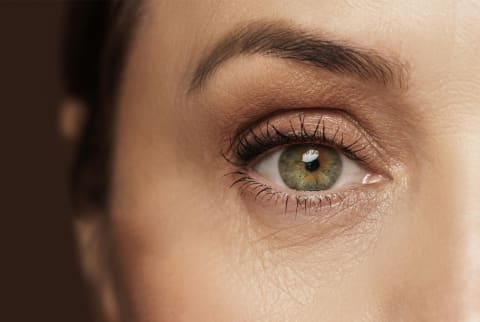Advertisement
If You're Seeing Fine Lines Around The Eyes, You May Need This Astaxanthin


As much as advertising may convince you that a single skin care product can make fine lines around the eyes "disappear," there's no such thing as a miracle eraser.
The truth is, no matter how many eye creams and "anti-aging" skin care products you use, you can't get around the need for a holistic approach: You need to be consistent with your skin care, get sleep, eat well, wear SPF daily, avoid stressors, and be smart about the sun. (Yes, 90% of visible skin aging can be attributed to sun exposure1, thanks to free radicals.) That's because all of these habits can contribute to free radical exposure.
Luckily, there is a way to naturally encourage healthy skin aging that specifically combats these free radicals, aka the root of skin aging at the source.
Enter: An antioxidant called astaxanthin. This marine-based antioxidant is traditionally found in salmon (i.e., from the algae the fish eats), which you've probably heard is a sort of skin superfood.
We're going to cover how astaxanthin may help your skin age with grace—including easing fine lines around the eyes.*
What is astaxanthin?
Your body naturally has antioxidants that work to fight off free radicals in the body, but you can better this defense system by consuming antioxidants and using them topically.*
Astaxanthin is an antioxidant, just like the other more well-known nutrient varieties, vitamins C and E, but has slightly different benefits.
Many phytonutrients (i.e., plant nutrients) have antioxidant properties. Phytonutrients are vast in number and thus grouped into "families" based on their distinct chemical structure and biological properties. These families include carotenoids (a type of terpenoid), flavonoids (a type of polyphenol), phenolic acids, and more.
Carotenoids are the ones responsible for giving red and orange foods their bright hues. Although beta-carotene (aka vitamin A) is one of the most well-known carotenoids, astaxanthin has been crowned "King of the Carotenoids."
That's because astaxanthin is five times more potent than beta-carotene, the good stuff in carrots, and a whopping 6,000 times more potent than vitamin C. (That's not to entirely discredit vitamin C, which your skin needs to build collagen, not to mention all of vitamin C's other essential roles in the body!)
If you're wondering why this powerful bioactive hasn't had a meaningful moment in the spotlight yet, we're with you. Luckily, there have been clinical studies2 dedicated to this unique antioxidant, many of which have impressive results for the skin.* Let's take a closer look at how astaxanthin can contribute to healthy skin aging.
How astaxanthin works in the skin & eye area
So we mentioned that sun exposure, lack of sleep, diet, and environmental stressors contribute to skin aging via free radicals, but let's get a quick refresher on how exactly this happens in the body.
"Free radicals set off a chain of events in your body that begin to cause signs of aging, including the breakdown of your collagen and elastin, which makes your skin wrinkle, sag, and appear thinner," dermatologist Keira Barr, M.D., previously told mbg.
So it makes sense that if you're looking to have healthy skin aging, getting in your antioxidants should be at the top of your priority list, next to SPF of course.
This is especially true for astaxanthin, as it almost acts as an internal sunscreen, enhancing skin photoprotection from UV rays and helping maintain a healthy inflammatory response:*
- Studies even show that astaxanthin can help delay the impacts of UV exposure3.*
- But that's not all; this antioxidant can actually benefit the skin post-sun and in the long term as well: Clinical research has found that astaxanthin helps improve skin wrinkles, age spot size, and skin texture4, as well as moisture content and skin elasticity5.*
And these effects can show up in particular around the very delicate eye area, which tends to experience dryness and fine lines faster due to the thinner skin.
In fact, in a double-blind clinical trial, individuals reported significant improvement in moisture levels, especially around the eyes, and experienced overall improved elasticity and appearance of tone.*
How to consume more astaxanthin:
Now that you know how beneficial astaxanthin can be for your skin, you're probably wondering how to get it into your diet without eating loads of salmon on a daily basis.
Luckily, this antioxidant can be found in certain supplements, including mindbodygreen best skin+.
The formula blends astaxanthin with other powerful healthy aging ingredients like blood orange extract and phytoceramides—this way, you're getting even more skin-loving power out of a single supplement.*
What's more? There are tons of benefits for astaxanthin in the body beyond healthy aging, so feel free to read our full breakdown here.*
The takeaway
It's important to nurture our skin from the inside out if we want to combat signs of skin aging. This means eating skin-loving foods, prioritizing sleep, and getting your fill of antioxidants.
Astaxanthin, particularly, has been clinically studied with compelling skin care results.*
But of course, no matter how many antioxidants you consume, you should always make SPF the first priority, especially in warmer months.